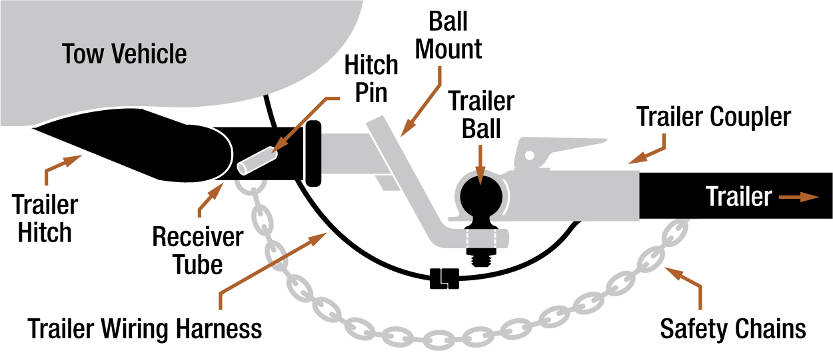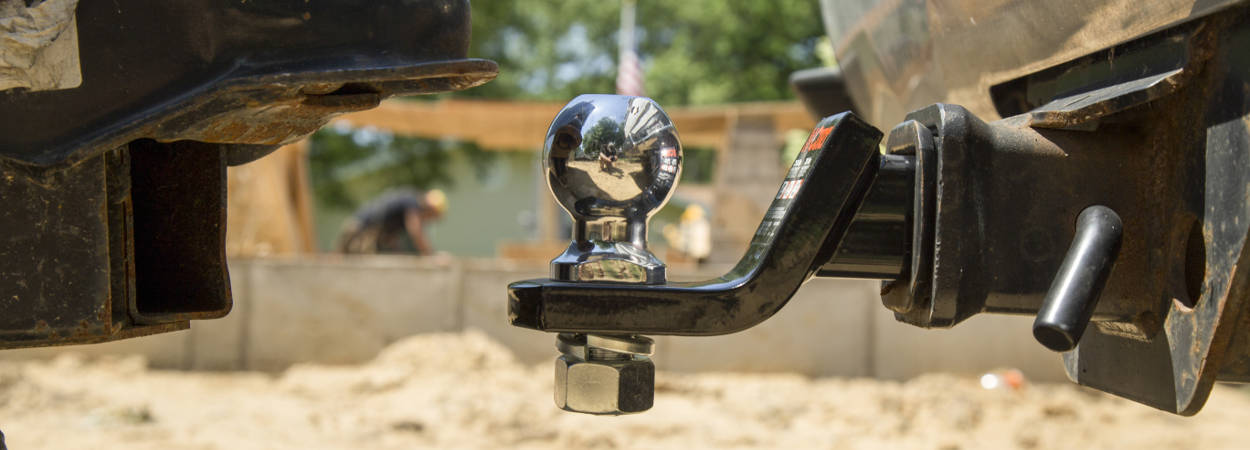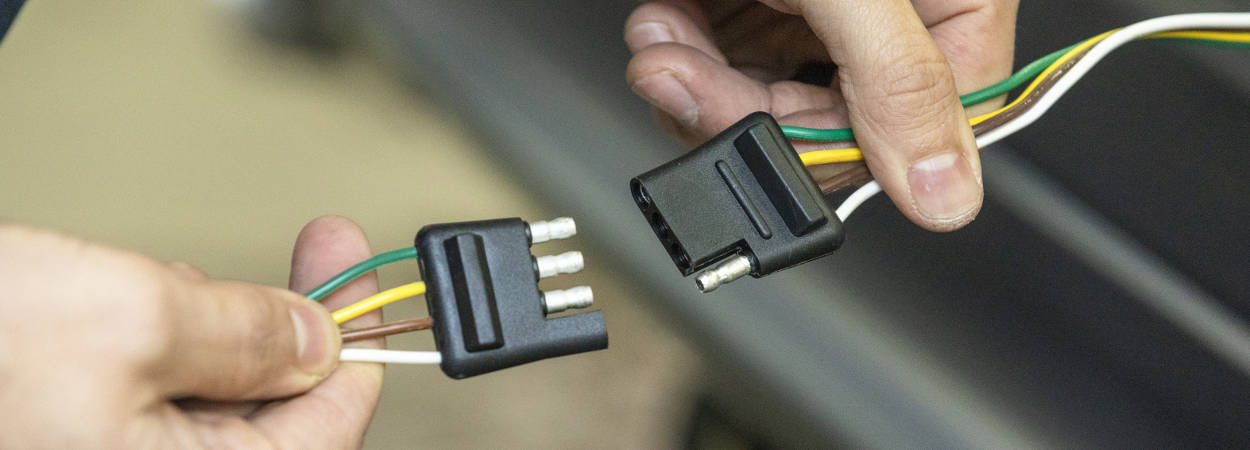There are many reasons why you many need to tow a trailer but perhaps you, like many drivers, are reluctant to tow a trailer. When towing a trailer for the first time, driving your vehicle may feel heavier, slower and unfamiliar.

So, you know that you have a hitch on the back of your vehicle but have never towed. Have no fear. Trailering isn’t as intimidating as one might think.
What is a trailer hitch?
A trailer hitch is the primary connector between a tow vehicle and trailer. It is the structural component that bolts onto the vehicle and provides a coupling point to hook up a trailer. The part that you see attached under your vehicle is technically called a receiver, or receiver hitch. This is the part that “receives” the ball mount and ball. A receiver hitch is a type of trailer hitch that bolts onto the underside of a vehicle, at the rear, and provides a tube for attaching a ball mount or other hitch accessory. Receiver hitches generally have a vehicle-specific design, a standard receiver tube size and fall within one of five hitch classes. A receiver hitch is perhaps the most common type of trailer hitch. So common, in fact, that the two terms are used interchangeably.
What is a tow hitch?
A tow hitch is simply another name for a trailer hitch. It is a hitch used for towing a trailer.
Usually, tow hitch refers specifically to a receiver hitch. However, a 5th wheel hitch, gooseneck hitch and other hitches may be called tow hitches. All trailer hitches -- or tow hitches -- are designed for a specific use and rated for specific weight capacities.

What Is a Ball Mount?
A ball mount is a receiver hitch accessory comprised of a shank and a trailer ball platform. The shank inserts into the hitch receiver tube, while the platform provides a solid mounting point for a trailer ball.
Ball mounts come in a variety of styles and capacities. Some are fixed, made up of a single piece. Others are adjustable. Virtually all ball mounts come with a hole in the shank to accept a hitch pin or hitch lock.
A trailer ball is the immediate connection point between your vehicle and trailer. It is made up of a metal ball and a threaded shank or stem. Trailer balls require an extreme amount of torque for installation -- far beyond your average torque wrench. Connected to the trailer coupler, a trailer ball allows you to turn corners and travel smoothly over bumps and hills.
There are 3 possible ball sizes that need to match up to the trailer’s coupler: 1 7/8″, 2″, and 2 5/16″. Do not try to tow with the wrong size ball. The trailer will not stay hooked up to your ball mount and could cause an accident while towing the trailer.
What Is a Hitch Pin?
A hitch pin is a small metal rod that keeps a ball mount shank from sliding out of a hitch receiver tube. Typically, a hitch pin is bent in an "L" shape. It is designed to insert into the side of the hitch receiver, pass through the ball mount shank and come out the other side. A hitch lock is a key-operated hitch pin that adds security and reassurance to your trailer hitch connection.
Hitch pins also have a hole on the end to accept a hairpin-shaped clip. The hitch clip is made from spring steel and keeps the pin retained in the receiver.
What Is a Trailer Coupler?
A trailer coupler, in conjunction with a trailer ball, connects a trailer to your vehicle. What is the front part of a trailer called? The answer is a trailer coupler. It is designed to latch onto a trailer ball and articulate around it for smooth towing.
Trailer couplers come in standard sizes, and many can be adjusted for a more secure connection. The size of the trailer coupler must match the size of the trailer ball to operate safely.
What Is a Safety Chain?
A safety chain is simply a length of chain strong enough to keep the trailer from complete separation if it ever becomes disconnected while towing. Two safety chains should be used on every towing setup.
Safety chains are fixed to the trailer tongue and have hooks that allow them to be linked to a vehicle's trailer hitch.

What Is a Trailer Wiring Harness?
A trailer wiring harness is a length of wire at the back of a vehicle that allows its electrical system to connect to a trailer. Integrated with the vehicle's existing wiring, it provides a standard connector, such as a 4-way flat plug. A trailer wiring harness supplies power to the trailer lights and synchronizes them with the vehicle's taillights. It can also be used to connect trailer brakes and auxiliary power.
Small trailers operate on a flat-4 wiring system, and most tandem axle trailers with electric brakes use a 7-way plug. In order to tow properly and legally, all trailer lights must work. There are also adapters available to take your truck side 7-way plug down to a flat-4 if that is what your trailer calls for.
What Is a Tow Vehicle?
A tow vehicle is any car, truck, van, crossover, SUV, RV or other automotive vehicle -- even an ATV -- used to pull a trailer.
What Is a Trailer?
A trailer is any wheeled construction that is pulled by another vehicle. Some common trailer types include utility trailers, popup campers, travel trailers, livestock trailers, flatbed trailers and boat trailers. A trailer can also be an automotive vehicle when it is dinghy towed by an RV.
Just like vehicles, trailers range in weight capacity.
Different tow vehicles have different weight capacities. As a rule, the lowest-rated towing component -- including the tow vehicle! -- must always limit the maximum amount of weight you can tow.
For questions about trailer license plates and local regulations, we recommend consulting the Department of Transportation.
Whether you are local and want to stop by to buy a trailer, or are reading this from afar, don’t be intimidated by a trailer. And most of all, be safe when you are towing. Follow all the necessary steps when hooking up, double check everything, and everything will work out just fine.
Until next time…..happy towing!
Questions? Call AJ's Truck & Trailer Center Now.
717-671-9115 • 844-673-7668